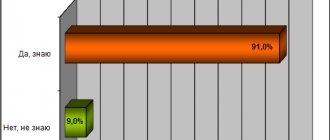Division of debt for utilities among owners (tenants)
155 of the Housing Code of the Russian Federation, from the content of which it can be concluded that payment documents for payment for residential premises and utilities are provided to the owner of residential premises in an apartment building.
We recommend reading: How to cancel a refusal of inheritance Consequently, if the residential premises are in the common shared ownership of several persons, then in accordance with Art.
249 of the Civil Code of the Russian Federation, each of them has the right, depending on the size of his share in the property right, to demand that the management organization conclude a separate agreement with him for the payment of payment for residential premises and utilities. At the same time, the law does not contain a prohibition on payment of payment for residential premises owned by several persons by several owners on the basis of one payment document.
WHAT CAN A UTILITIES DISPUTES LAWYER CAN HELP YOU WITH?
Each of us is somehow connected with public services. We receive receipts in mailboxes or by email, are horrified by the figures for the accrued amounts, sigh and go to pay them. But what if there is still an error in the charges - and instead of sighing sadly, you can only shrug your shoulders and call your utility payment lawyer. As soon as a professional looks at the receipt, he will immediately see whether there is an error in the charges or not. Sometimes the errors are purely technical in nature - an error in the size of the living space that occurred due to a failure of the program in which the accruals occur, untimely updating of information on changed tariffs, and more: all this can affect the amount of accruals that you see on the receipt.
And if the situation is even worse - your close relative or acquaintance has died, but for some reason astronomical bills continue to accumulate in an apartment in which no one lives, as if a large family continues to live in it?
In each of these situations, it is the lawyer for communal disputes who will be the one who will lend you a helping hand, lend a shoulder, and if we put loud epithets aside, it is the lawyer for communal disputes who will do everything to save you from all the problems associated with both pre-trial settlement of the dispute, as well as its judicial proceedings.
The first thing to note is that even if the law does not provide for mandatory judicial procedure, it may be provided for in an agreement concluded between you and the management organization or supplier of a utility resource. To ensure that the court does not return the statement of claim to you with all the materials, it is necessary to clearly monitor this point. And we think you no longer have any questions about who to contact in such a situation.
How to divide utility debt
Theoretically, any adult and capable person who has registration in the disputed apartment can ask for this.
Until 2005, such a procedure was regulated by Article 86 of the Housing Code of the RSFSR. The Housing Code that is currently in force does not regulate (does not prohibit or allow) the division of accounts, therefore the housing and communal services have the right to refuse to re-issue contracts.
After the publication of a new code prohibiting the formation of communal apartments, disputes over the division of accounts arose even among professional lawyers.
Arrears in payments for living space, utility bills
- written notification to the debtor about the possible application of eviction proceedings;
- filing a claim in court for the forced eviction of the debtor;
- After the court's decision, the person will be given 7 days to voluntarily evict, and then a compulsory order will be carried out.
It is worth noting that before the service provider makes a decision to limit the supply of a resource, the debtor is notified of the existence of a debt and given a debt repayment period of at least 1 month. At the same time, utility debts are calculated on the basis of accepted standards in the management company, that is, payment must be made for the service actually used according to the tariffs of the management company. Three days before the application of the measure to limit the supply of energy resources, the debtor is sent a second notification.
Statement of claim for division of personal account
The state fee for disputes related to participation in payment for housing is 200 rubles.
since the dispute is non-property, the price of the claim on it is not determined. In _____________________________ (name of the court) Plaintiff: _________________________ (full name, address) Defendant. ______________________ (full name, address) Defendant: ______________________ (full name of the management company, address) STATEMENT OF CLAIM for the division of a personal account, determination of shares in payment for housing maintenance and utilities I am the owner (tenant) of a residential premises at the address _________ (full address) , together with me the owner (members of the tenant's family) is also _________ (full name of other living citizens). The defendant does not pay for housing and utilities.
We recommend reading: Dismissal of an employee due to loss of trust
NTVP Kedr
The lawyer drew up an application to defer the court decision and handed it to applicant V. It was also explained to her that the application must be submitted to the Leninsky District Court (which made the decision to collect the debt on payments for living space) in 2 copies in one of the following ways:
Please note => If the maternity capital was received in another city, then obtain a certificate of balance in another city
The right to defer a court decision is also enshrined in Art. 203 of the Code of Civil Procedure of the Russian Federation, according to which the court that examined the case, upon applications of the persons participating in the case, the bailiff, or based on the property status of the parties or other circumstances, has the right to postpone or defer the execution of the court decision, change the method and procedure for its execution. Such an application is considered in court.
Dividing a personal account for utility bills
This provision is contained in the Housing Code of the Russian Federation. Part 2 of Article 154 of the RF Housing Code:
“Payment for residential premises and utilities for the owner of premises in an apartment building includes: 1) payment for the maintenance and repair of residential premises, which includes payment for services and work on managing the apartment building, maintenance, current and major repairs of common property in apartment building; 2) payment for utilities."
From the Review of Legislation and Judicial Practice of the Supreme Court of the Russian Federation for the fourth quarter of 2006 (approved.
Judicial practice on determining the use of a municipal apartment
As justification for the fact that it is also possible to determine the procedure for use in municipal apartments, one can refer to “positive” judicial practice that is in the public domain, namely: The appeal decision of the court of appeal of the Kirovsky district of Omsk dated 10/11/07, issued on appeal against the decision of the magistrate of the court district No. 51 of the KAO of the city of Omsk in case No. 23189/2007 “On determining the procedure for using residential premises with the opening of separate financial personal accounts.” Appeal ruling of the judicial panel for civil cases of the Rostov Regional Court dated July 26, 2012 in case No. 33-8603 on an appeal against the decision of the Azov City Court of the Rostov Region dated May 11, 2012. As a legislative basis for these claims, the following arguments are usually given : In accordance with paragraph 2 of Art. 1 Residential Complex of the Russian Federation –
Citizens, at their own discretion and in their own interests, exercise their housing rights, including disposing of them. Citizens are free to establish and exercise their housing rights by virtue of an agreement and (or) other grounds provided for by housing legislation. Citizens, exercising housing rights and fulfilling the obligations arising from housing relations, must not violate the rights, freedoms and legitimate interests of other citizens.
In accordance with paragraph 3 of Art. 1 of the Housing Code of the Russian Federation - housing rights can be limited on the basis of federal law and only to the extent necessary in order to protect the foundations of the constitutional system, morality, health, rights and legitimate interests of other persons. In accordance with. clause 1 art. 7 Housing Code of the Russian Federation –
In cases where housing relations are not regulated by housing legislation or an agreement between the participants in such relations, and in the absence of civil or other legislation directly regulating such relations, housing legislation regulating similar relations is applied to them, unless this contradicts their essence.
In addition, in accordance with paragraph 2 of Art. 7 Housing Code of the Russian Federation –
If it is impossible to use an analogy of law, the rights and obligations of participants in housing relations are determined based on the general principles and meaning of housing legislation (analogy of law) and the requirements of good faith, humanity, reasonableness and fairness.
Also, when justifying their position, persons wishing to determine the procedure for use usually point out that - there is no agreement between the parties regulating the procedure for using the rooms in the disputed residential premises - apartment No. 24. Moreover, in accordance with Art.
60 - 61 of the Housing Code of the Russian Federation - the parties (persons registered in the premises) have equal rights to use the specified apartment, and Chapter 8 of the Housing Code of the Russian Federation does not directly regulate the procedure for such use in the case of social rental of residential premises. In this regard, they believe that in order to protect their rights and legitimate interests, it is possible to apply by analogy the provisions of civil legislation on the procedure for owning and using residential premises owned by citizens who have equal rights to it. They also usually ask the court to take into account the provisions of Art. 15, 16 of the Housing Code of the Russian Federation on objects of housing rights, that is, on residential premises and its types. At the same time, they believe that the application of the analogy of the law to the relations of use in the social rental of residential premises does not contradict their essence and complies with the provisions of paragraph 4 of Art. 17 of the Housing Code of the Russian Federation, in accordance with which the use of residential premises is carried out taking into account the rights and legitimate interests of citizens living in this residential premises.
And in accordance with Art. 244, 247 of the Civil Code of the Russian Federation, property (indivisible things) can be in common ownership with the determination of the share of each participant (shared ownership). In this case, the participants own and use the common property by agreement between them, and if agreement is not reached, in the manner established by the court. At the same time, a participant in shared ownership has the right to be provided with possession and use of a part of the common property commensurate with his share. After this, it is usually mentioned that the share of the plaintiff’s (or co-plaintiffs’) living space fully or at least approximately corresponds to the room that they are asking to secure for sole use.
Need a lawyer? Let's help! Call: +7 (499) 348-8921 or However, the courts of metropolitan cities, primarily Moscow and St. Petersburg, as well as a number of other large cities, have already formed “negative” judicial practice based on refusal in satisfying this type of dispute, examples of which include the following court decisions: In accordance with the cassation ruling of the St. Petersburg City Court dated 03.03.11 in case No. 33-3015
If residential premises in a dormitory, in which the parties to the case (spouses) legally use separate rooms, are excluded from the specialized housing stock and included in the housing stock for social use, the spouses have an equal right to use the residential premises, and the spouse has not yet exercised his right to conclude a social tenancy agreement, the court reasonably came to the conclusion that it was possible to conclude such an agreement with his wife” - “The law does not provide for the possibility of determining the procedure for using residential premises occupied under social tenancy conditions. Taking into account the absence of a legally established procedure for dividing living space at the request of one of the citizens using living space under the same lease agreement, the court rightfully refused to satisfy A.E. requirements to determine the procedure for using residential premises as not based on the law.
In accordance with the cassation ruling of the Perm Regional Court dated 07/04/11 in case No. 33-6567
Since the disputed residential premises were provided on the basis of one order and, therefore, under a single social tenancy agreement, the requirement to determine the procedure for using residential premises in the apartment cannot be satisfied” - “Since the disputed residential premises were provided on the basis of one order and, therefore, under a single social tenancy agreement, and the norms of the Housing Code of the Russian Federation do not provide for the conclusion of a separate tenancy agreement for the occupied area of a residential premises, the court of first instance came to the correct conclusion that there were no legal grounds for satisfying the claims. The existing conflictual relations between the parties, as well as the fact that a certain procedure for use has developed in the apartment, cannot serve as grounds for satisfying the claim.
In accordance with the cassation ruling of the Moscow City Court dated October 4, 2011 in case No. 33-31561
The claims for the division of residential premises and the conclusion of separate rental agreements for residential premises were rightfully refused, since housing legislation does not provide for changes to the social tenancy agreement for residential premises and the conclusion of a separate social tenancy agreement with a former member of the tenant’s family” - “The possibility of determining the procedure for using residential premises and transfer for use of a share of property belonging to the owner is provided only in residential premises that have the status of residential premises owned by participants in shared ownership.... In relation to residential premises, the use of which is carried out on the basis of social tenancy agreements, such an opportunity is not provided to tenants and members of their families. Based on the scope of housing rights of the tenant and his family members, defined by Art. Art. 67, 69 of the Housing Code of the Russian Federation, the court came to the correct conclusion of refusing to satisfy the claim as not based on the norms of substantive law.
In accordance with the appeal ruling of the Tambov Regional Court dated 07/02/12 in case No. 33-1817
The claim to determine the procedure for using residential premises was rightfully refused, since determining the procedure for using the disputed housing is actually a change in the social tenancy agreement for residential premises, and changes in the social tenancy agreement are not provided for by housing legislation" - "The court of first instance, considering this dispute, came to the conclusion that, in essence, the plaintiff raises the question of allocating a separate room for him and his daughter to use, that is, in fact, the question is raised of changing the rental agreement for residential premises and concluding a rental agreement for one of the rooms. At the same time, as the court correctly pointed out, neither the Civil Code of the Russian Federation nor the Housing Code of the Russian Federation provides for the possibility of imposing on the landlord the obligation to change the concluded social tenancy agreement for residential premises or to conclude a new social tenancy agreement for residential premises with the tenant and members of his family... The plaintiffs' demand related to determining the procedure for using residential premises occupied under a social tenancy agreement between the tenant and members of the tenant's family is not provided for by law (Article 11 of the Housing Code of the Russian Federation) as a way to protect housing rights.
In accordance with the appeal ruling of the Moscow Regional Court dated 09/06/12 in case No. 14223/2012
The claim to determine the procedure for using the apartment was rightfully refused, since the current legislation does not provide for the determination of the procedure for using the residential premises occupied by the floor of the social tenancy agreement” - “in resolving the dispute, the court was rightfully guided by Art. 60, 61, 62, 67, 69 of the Housing Code of the Russian Federation and came to the correct conclusion that G. refused to satisfy the stated requirements, since the determination of the procedure for using residential premises occupied under a social tenancy agreement is not provided for by the current legislation, with which the judicial panel agrees.
In accordance with the decision of the judge of the Kuzminsky District Court Sokolova E.T. dated 04/14/14 in case No. 3-2384/14 in the claim of V.I. Kralin. to Kralina T.V., Kralina O.V. “On determining the rules for using an apartment” -
The court comes to the conclusion that by filing a claim in court to determine the procedure for using an apartment with the allocation of specific rooms to the parties, the plaintiff is actually raising the question of changing the social tenancy agreement for residential premises.
Personal account section: how to get separate receipts for housing and communal services?
The division of personal accounts undertaken by some citizens is useful in case of disputes regarding apartment payments.
To do this, you need to contact the ERIC at your place of residence; the procedure is legal and based on housing and civil legislation. During initialization, there may be obstacles that will have to be resolved in court.
After an affirmative decision, you can pay utility bills separately to property owners or tenants who want to carry out this procedure.
How to split a personal account
After changes to the Housing Code
, the division of personal accounts for payment of utility services is not regulated in any way by legislative acts.
This is explained by the decisions of government agencies to completely eliminate communal apartments from the housing stock. Splitting utility bills actually means creating two or more rooms in an apartment.
They will be considered communal, since all residents will have a separate financial account.
In reality, if the second occupant owner does not pay rent, it is very difficult, but possible, to divide payments according to shares. Creating separate receipts for utility expenses while maintaining a single financial account is not prohibited, which is what many residents of multi-storey buildings use.
According to the legislation of the Russian Federation, the division of utility bills and other fees for housing and communal services between owners is feasible because:
- all property owners are responsible for late payments, which they are required to make when living in residential premises in accordance with their shared ownership in it, as stated in Article 249 of the Civil Code of the Russian Federation
; - in municipal premises, each resident must also pay utility bills on time.
It is not possible to split payment receipts in the following cases:
- housing belongs to a departmental housing fund;
- with sole ownership of property;
- the residential premises were seized by the judicial authorities.
According to the laws, only people who are not related to each other can split receipts. In other words, the owners of divisible property must divorce if they are husband and wife. They are also required to have incomes independent of each other.
All residents use utilities, and receipts for expenses are sent to the tenant. But this does not mean that he must pay all debts if one of the owners does not fulfill his obligations to pay utility bills. All registered residents are required to pay utility costs.
In the case of communal housing, it is possible to separate receipts for housing and communal services if the consumption of water and energy resources is separate from others. In such circumstances, residents install independent metering devices in order to accurately pay only for their expenses, as well as for the number of rooms occupied. Next, we’ll look at how to separate receipts for municipal and privatized premises.
In a municipal apartment
division of a personal account in a municipal apartment can only be done in rare circumstances. in practice, this can be done by divorced spouses who have entered into a social rental agreement and live in the same apartment. after the separation, they will pay for housing separately from each other.
In a non-privatized apartment, you can divide your personal account in two ways:
- with the voluntary consent of all persons registered in the housing. At the same time, residents of a municipal apartment draw up and confirm with a notary an application to divide the personal account among themselves. To obtain such permission, the agreement of all residents registered in the residential premises is required. After completing these documents, you need to provide them to the authorities at your place of residence in order to separate receipts for utility costs.
- through the court. If family members of the tenant of the residential premises refuse to split the payments, then an application must be submitted to the courts. To do this, you should file a claim to clarify the share. You should also request a split payment for everyone registered in the housing. This will be discussed in more detail below.
After the division, residents can file a claim for collection of arrears of utility costs against an unscrupulous defaulter.
in a privatized apartment
The division of a personal account in a privatized apartment is carried out on the basis of Article 249 of the Civil Code of the Russian Federation
.
it stipulates that all owners are required to make payments in accordance with their share. The obligation to pay for utility costs is stipulated in Article 155 of the Housing Code
. According to all these laws, owners must contribute money in proportion to their shares in residential property.
Each property owner has the right to contact the HOA or UC company to formalize an agreement for the separate payment of utility costs. To apply you must provide:
- an application requesting the division of receipts;
- title document for the occupied residential premises.
As in situations with municipal housing, with privatized apartments there are two options for events:
- under a voluntary agreement, when the sharing of utility bills by the owners occurs with their full approval. in this case, you only need to certify the shared ownership of the property in order to divide the receipts. All parties to the contract draw up an agreement that must be notarized. After determining the shared ownership of all residents, they must come to the Rosreestr to receive a certificate for their own shares. then, with the collected papers, you need to contact the management company or homeowners association that provides housing and communal services, with a written application for the provision of an independent account.
- If the owners of shares do not agree to divide payments in a separate apartment, they must contact the courts. the allocation of a separate account is carried out in such cases only after the corresponding decision of the judge. To implement such a decision, you need to write an application for the division of utility bills; after receiving approval, the management company is obliged to divide the payments. Property owners may receive a refusal in a situation where there are debts to pay utility bills. after their repayment, the claim will be approved.
if not all property owners agree to split payments, then you should first obtain a document about your own share, and then apply to the courts to split utility bills.
judicially
Separation of bills in court is necessary if those living in the premises do not agree to share the share of payment of utility costs. The statement of claim must be filed with the court at the place of registration of the housing property.
Housing disputes regarding the division of payment on receipts are recognized by government bodies as non-property, as a result of which the amount of state duty is 300 rubles in accordance with the tax legislation of the Russian Federation.
To file a claim in court for the division of payments, you must collect the following documents:
- application for division of personal account;
- social lease agreement or defining documents for real estate that confirm the legality of ownership;
- agreements with companies that supply water, gas and electricity to residential premises;
- agreement;
- extract from personal account;
- a document stating whether there are debt obligations to pay for utilities or their absence;
- technical passport of the premises.
A sample claim can be obtained from the court. A professional lawyer who will bypass all the pitfalls of housing legislation will help you correctly draw up all the clauses of the agreement on the division of your personal account. Both everyone living in the disputed housing and the employees of the utility company servicing this premises must comply with the court decision.
Refusal to allocate a share and divide payment documents may occur if the characteristics of the residential premises are incompatible with existing residential legislation (number of rooms, their size, lack of a bathroom, etc.). After satisfying the claim in favor of dividing receipts, the management company must divide and send separate payments for utilities the next month.
Source: https://zen.yandex.ru/media/id/59dce336a815f198eb6a6e3f/5a784cd2a867311bced4273c





